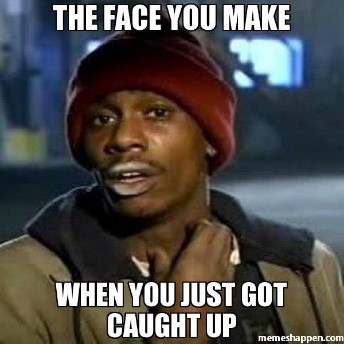Are you late for dinner? You could say you got ‘caught up’ at the office to explain your tardiness. This post unpacks the meaning and origin of this expression.
Meaning
The expression 'caught up' means to be carried away with something that you're unconcerned about what's going on around you. You could lose track of time in this state and forget about other commitments you have. If you're 'caught up,' it means that you're involved in a task or activity demanding all your focus and attention. As a result, you don't pay attention to what's happening around you.
Being 'caught up' in a situation means that you're involved in it in some way. You disregard how unsure you are of the problem and the possibility of an adverse outcome.
You can also get 'caught up' with the police after engaging in criminal activities that bring you under the scrutiny of the law. If you get 'caught up,' you're responsible for the outcome of the situation.
Example Usage
"Sorry, I'm late. I got caught up with a client at work and couldn't get away. Some people just keep talking, and I don't know how to shut them up."
"I got caught up with the cops on the weekend. They were trying to pin a local burglary on me. They said the boot tracks in the snow led them to my front door."
"I got caught up in our relationship and started to neglect other areas in my life. Toxic people can be exhausting, and I'm glad I'm out of it."
"I got totally caught up in that movie. The last three hours just flew by. I hope they make a sequel that's just as good."
"Look, you got caught up in the situation, and there was nothing you could do. It's not like you were planning to join them in the robbery. You didn't even know who those people were."
"I got caught up in the moment and didn't realize she was calling me. Now I have to go home and listen to her tell me how I never pay attention to her, great."
"We just got caught up with it and didn't realize the time. Don't be angry. We weren't doing it on purpose, I promise."
"I got so caught up in the last season of 'Succession' that I couldn't watch anything else. I binged it all in a single weekend. What am I doing with my life?"

Origin
Language experts are unsure of the origin of the expression ‘caught up, or who was the first to coin the phrase in language. There is no information available on the development of the term other than an entry in the Urban Dictionary, dating to 2004.
Phrases Similar to Caught Up
- Lost in thought.
- Absorbed.
- Engrossed.
- Preoccupied.
Phrases Opposite to Caught Up
- At attention.
- Situational awareness.
What is the Correct Saying?
- Caught up.
Ways People May Say Caught Up Incorrectly
The phrase 'caught up' doesn't refer to 'catching' something. It means you got carried away with activities, tasks, or conversations to the detriment of something else. The phrase has nothing to do with catching anything, and it's not a sports reference.
Acceptable Ways to Phrase Caught Up
You can use 'caught up' in situations where you want to imply you were 'in the moment' or distracted by what you were doing. It's important to note that 'caught' in this instance is a 'phrasal verb.' Phrasal verbs have different meanings from their original definition. In this case, 'caught' refers to being swept away in your activities or thoughts.
The phrase suits professional and social use. You could tell your manager that you didn't get around to finishing the report because you got 'caught up' with a client. You could tell your friends you were late for the barbeque because you got 'caught up' with work. You can use 'caught up' in text conversations and verbal exchanges.
